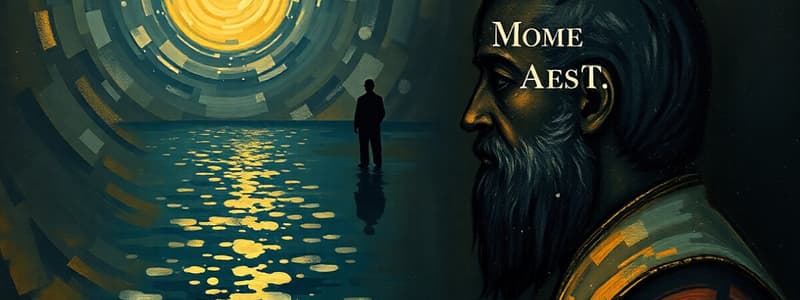Podcast
Questions and Answers
What aspect of human nature did St. Augustine emphasize?
What aspect of human nature did St. Augustine emphasize?
- The social interactions of individuals
- The duality of body and soul (correct)
- The eternal nature of the body
- The material composition of human beings
Which philosopher is known for the statement 'I think therefore, I am'?
Which philosopher is known for the statement 'I think therefore, I am'?
- Gilbert Ryle
- David Hume
- René Descartes (correct)
- Plato
According to Thomas Aquinas, what is the role of the soul?
According to Thomas Aquinas, what is the role of the soul?
- To provide a pathway to immortality
- To experience earthly pleasures
- To govern desires and emotions
- To animate the body and impart essence (correct)
What does David Hume's Bundle Theory suggest about the self?
What does David Hume's Bundle Theory suggest about the self?
What is Sigmund Freud's concept of the Id primarily concerned with?
What is Sigmund Freud's concept of the Id primarily concerned with?
What is the view of Gilbert Ryle regarding the existence of the self?
What is the view of Gilbert Ryle regarding the existence of the self?
What key aspect did Merleau-Ponty deny in his view of the self?
What key aspect did Merleau-Ponty deny in his view of the self?
What are the three components of the soul according to Plato?
What are the three components of the soul according to Plato?
What is a key focus of Socrates' philosophy regarding the self?
What is a key focus of Socrates' philosophy regarding the self?
Which notion best describes Thomas Aquinas' view of the self?
Which notion best describes Thomas Aquinas' view of the self?
What transformation regarding the self did St. Augustine highlight?
What transformation regarding the self did St. Augustine highlight?
What fundamental belief does David Hume's Bundle Theory suggest?
What fundamental belief does David Hume's Bundle Theory suggest?
According to Rene Descartes, what can be unquestionably asserted about the self?
According to Rene Descartes, what can be unquestionably asserted about the self?
What does Merleau-Ponty argue regarding the relationship between the mind and the body?
What does Merleau-Ponty argue regarding the relationship between the mind and the body?
Which driving forces does Sigmund Freud identify as fundamental to understanding the self?
Which driving forces does Sigmund Freud identify as fundamental to understanding the self?
What does Gilbert Ryle emphasize about the nature of the self?
What does Gilbert Ryle emphasize about the nature of the self?
Flashcards are hidden until you start studying
Study Notes
Understanding the Self
- Essential for personal identity and moral responsibility.
- Different philosophical perspectives provide varied insights into self-awareness and existence.
Notions of the Self Across Philosophers
- Socrates: Emphasized the dualistic nature of existence with body and soul as separate entities, focusing on personal knowledge.
- Plato: Supported duality; identified three components of the soul: rational (reason), spirited (emotion), and appetitive (desires).
- St. Augustine: Presented a bifurcated nature of humans; the body is mortal while the soul seeks eternal life, aiming for divine communion and bliss.
- Thomas Aquinas: Defined humans as a combination of matter (hyle) and form (morpe), with the soul providing essence and animation to the body.
- Rene Descartes: Established modern philosophy through the statement “I think therefore, I am,” distinguishing between mind (cogito) and body (extenza).
- David Hume: Introduced Empiricism and Bundle Theory, where knowledge comes from senses; proposed that the self is a collection of impressions and ideas.
- Sigmund Freud: Developed Psychoanalysis, asserting that human behavior is driven by Eros (life instinct) and Thanatos (death instinct), and outlined the mind's structure with id, ego, and superego.
- Gilbert Ryle: Argued against an internal, non-physical self, suggesting that behavior is the true measure of identity.
- Merleau-Ponty: Critiqued dualism, arguing that the mind and body are inseparable and that they interact as a unified experience.
Self Reflection Questions
- Encourage introspection on personal identity and transformation.
- Explore connections between self, body, and community of selves.
- Contemplate the concept of self after death, raising questions of continuity and existence beyond physical life.
Understanding the Self
- Essential for personal identity and moral responsibility.
- Different philosophical perspectives provide varied insights into self-awareness and existence.
Notions of the Self Across Philosophers
- Socrates: Emphasized the dualistic nature of existence with body and soul as separate entities, focusing on personal knowledge.
- Plato: Supported duality; identified three components of the soul: rational (reason), spirited (emotion), and appetitive (desires).
- St. Augustine: Presented a bifurcated nature of humans; the body is mortal while the soul seeks eternal life, aiming for divine communion and bliss.
- Thomas Aquinas: Defined humans as a combination of matter (hyle) and form (morpe), with the soul providing essence and animation to the body.
- Rene Descartes: Established modern philosophy through the statement “I think therefore, I am,” distinguishing between mind (cogito) and body (extenza).
- David Hume: Introduced Empiricism and Bundle Theory, where knowledge comes from senses; proposed that the self is a collection of impressions and ideas.
- Sigmund Freud: Developed Psychoanalysis, asserting that human behavior is driven by Eros (life instinct) and Thanatos (death instinct), and outlined the mind's structure with id, ego, and superego.
- Gilbert Ryle: Argued against an internal, non-physical self, suggesting that behavior is the true measure of identity.
- Merleau-Ponty: Critiqued dualism, arguing that the mind and body are inseparable and that they interact as a unified experience.
Self Reflection Questions
- Encourage introspection on personal identity and transformation.
- Explore connections between self, body, and community of selves.
- Contemplate the concept of self after death, raising questions of continuity and existence beyond physical life.
Studying That Suits You
Use AI to generate personalized quizzes and flashcards to suit your learning preferences.




